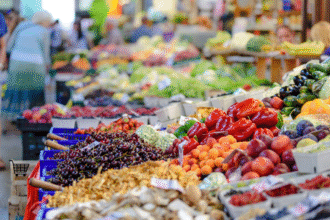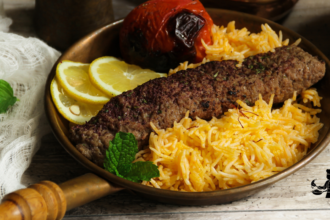Maintaining balanced nutrition is essential for a healthy lifestyle, especially in the fast-paced and diverse environment of the United Arab Emirates. With long working hours, busy family lives, and the abundance of international cuisines, it can sometimes feel challenging to keep healthy eating habits on track.
- 1. Prioritize Whole Foods Over Processed Options
- 2. Stay Hydrated with Smart Choices
- 3. Balance Macronutrients in Every Meal
- 4. Practice Portion Control and Mindful Eating
- 5. Plan Ahead for Consistency
- Building a Healthier Future
- FAQ
- What are the best healthy snacks for busy professionals in the UAE?
- Is it possible to enjoy traditional Emirati food while eating healthy?
- How much water should I drink daily in the UAE climate?
- Are meal delivery services reliable for balanced nutrition in Dubai?
- What role do spices play in balanced nutrition?
- Can I follow balanced nutrition if I eat out frequently?
- Do I need supplements if I maintain a balanced diet?
However, balanced nutrition is not about strict restrictions or complicated rules it’s about making smarter choices, enjoying food in moderation, and ensuring your body receives the fuel it needs. If you’re seeking structured solutions, professional meal plans Dubai can provide excellent guidance, but let’s first explore practical advice you can start applying today.
1. Prioritize Whole Foods Over Processed Options
In the UAE, where supermarkets and restaurants offer a wide variety of ready-to-eat meals, it’s tempting to choose convenience over quality. However, processed foods often contain high amounts of sugar, salt, and unhealthy fats, which can increase the risk of obesity, diabetes, and cardiovascular issues conditions that are already a growing concern in the region.
Instead, it’s better to build your meals around whole foods such as fresh vegetables, fruits, lean proteins, whole grains, and legumes. Not only do they provide essential vitamins and minerals, but they also help regulate blood sugar levels and maintain a steady flow of energy throughout the day.
Minor adjustments in daily eating habits can make a significant difference:
- Swap sugary snacks for nutrient-rich options like dates, almonds, or walnuts.
- Replace refined white rice with fiber-packed alternatives such as brown rice, bulgur, or quinoa.
- Choose grilled or baked proteins like fish and chicken instead of fried fast food.
- Add fresh salads or vegetable sides to balance heavier meals.
- Opt for whole-grain bread or wraps instead of refined white bread.
These simple but consistent changes make it easier to sustain energy during long working hours, improve digestion, and support overall health even in the hot and demanding climate of the UAE.
2. Stay Hydrated with Smart Choices
Hydration is crucial in the UAE, where high temperatures and dry air can quickly lead to dehydration. While water should be your primary choice, you can also benefit from hydrating foods like cucumbers, watermelon, and citrus fruits. Avoid excessive consumption of soft drinks or energy drinks, which can add unnecessary sugar and calories.
Herbal teas, coconut water, and naturally flavored water are refreshing alternatives. Keeping a reusable water bottle with you at work, in the car, or while exercising makes it easier to maintain hydration as part of your daily routine. In addition, drinking water regularly instead of waiting until you feel thirsty helps prevent fatigue, headaches, and reduced concentration levels.
It’s also beneficial to spread your fluid intake evenly throughout the day, rather than consuming large amounts at once. For people who exercise outdoors, especially during summer months, combining water with electrolyte-rich drinks can further support the body’s hydration and recovery needs.
3. Balance Macronutrients in Every Meal
Every meal should contain a proper balance of carbohydrates, proteins, and healthy fats. Carbohydrates give you energy, proteins help with muscle repair, and fats support brain and heart function. In the UAE, where international dining is popular, it’s easy to overindulge in one nutrient group such as heavy carbs from rice and bread while neglecting others.
A simple guideline is to fill half of your plate with vegetables, one-quarter with lean protein like fish or chicken, and one-quarter with whole grains. Healthy fats, like olive oil, avocados, and nuts, should be included in moderation.
| Macronutrient | Role in the Body | Best Sources |
| Carbohydrates | Energy for daily activity | Brown rice, quinoa, dates |
| Protein | Muscle repair & growth | Grilled fish, chicken, and lentils |
| Healthy fats | Health for heart and brain | Olive oil, nuts, avocados |
By making sure your meals include all three macronutrients, you avoid sudden spikes and drops in blood sugar, which can leave you feeling tired or craving unhealthy snacks. A balanced plate also supports long-term weight management and helps maintain steady energy levels, significant for both office workers and those with physically demanding jobs.
Over time, these habits reduce the risk of chronic illnesses and promote a more sustainable, health-focused lifestyle that fits well with the busy pace of life.
4. Practice Portion Control and Mindful Eating
Abundance is part of the food culture in the UAE, from generous family meals to large restaurant servings. While enjoying food is important, portion control prevents overeating and supports weight management. Eating slowly, listening to your body’s hunger cues, and avoiding distractions like TV while dining can improve digestion and satisfaction.
Instead of eliminating your favorite dishes, reduce portion sizes and combine them with healthier sides. This approach makes it easier to stick to balanced eating long-term without feeling deprived.
Mindful eating also helps strengthen your relationship with food. By paying attention to flavors, textures, and aromas, you enjoy meals more fully and become more aware of when you are actually satisfied. Some practical steps include:
- Using smaller plates to naturally reduce portion sizes.
- Serving vegetables and salads first before heavier foods.
- Taking short breaks during meals to check if you’re still hungry.
- Sharing large restaurant dishes with a friend instead of finishing them alone.
These simple techniques prevent unnecessary calorie intake and create a healthier dining experience, especially when surrounded by tempting buffets or festive gatherings in the UAE.
5. Plan Ahead for Consistency
Busy schedules in Dubai, Abu Dhabi, and other cities often push people towards unhealthy last-minute food choices. Planning meals ahead of time ensures you always have access to nutritious options. Planning also makes grocery shopping more efficient, reduces food waste, and allows you to explore healthier recipes without stress.
Consistency is key when it comes to nutrition, and preparation is what makes consistency possible. A little planning saves you from relying on fast food or sugary snacks during busy days. For example, you can prepare overnight oats for breakfast, pre-pack salads in jars for quick lunches, or freeze healthy soups for dinners. Keeping a supply of easy-to-grab items like fruit, boiled eggs, or hummus with vegetable sticks ensures you always have a smart option at hand.
By building meal preparation into your weekly routine, you develop habits that make healthy eating the default choice rather than a challenge. Over time, this structure not only improves physical well-being but also reduces stress about “what to eat” each day, leaving more space for enjoying life in the UAE’s dynamic environment.
Building a Healthier Future
Balanced nutrition is not about perfection it’s about developing daily habits that nourish your body and mind while fitting into your lifestyle. In the UAE, where food culture is diverse and the pace of life can be demanding, making intentional choices becomes even more important. By prioritizing whole foods, staying hydrated, balancing macronutrients, practicing mindful eating, and planning ahead, you can achieve better energy levels, stronger immunity, and long-term health benefits.
What makes this journey even more rewarding is that small, consistent changes bring visible results over time. Improved digestion, better sleep, higher concentration, and even clearer skin are all natural outcomes of balanced nutrition. You don’t need to give up the rich culinary traditions or international flavors available across Dubai, Abu Dhabi, and beyond instead, learn to enjoy them in moderation and pair them with healthier practices.
Whether you cook at home, dine out, or rely on personalized meal plans, the key is consistency. Building this foundation of health today means investing in a stronger, more fulfilling tomorrow.
FAQ
What are the best healthy snacks for busy professionals in the UAE?
Smart snacking keeps energy levels stable between meals. Nuts, such as almonds and cashews, provide healthy fats and protein, while dates give natural sweetness and quick energy. Yogurt with fresh fruit adds probiotics and vitamins, and hummus with cucumber or carrot sticks is both refreshing and filling. These snacks are easy to prepare, portable, and support balanced nutrition during long workdays.
Is it possible to enjoy traditional Emirati food while eating healthy?
Traditional Emirati dishes like harees or grilled fish can be highly nutritious if cooked with less oil and served with vegetables. The key is moderation avoid oversized portions and balance heavier meals with lighter options during the day. You can also swap fried samosas for baked ones or replace white rice with brown rice for added fiber. This way, you enjoy cultural favorites while protecting your health.
How much water should I drink daily in the UAE climate?
In hot weather, the body loses fluids more quickly, so an adult should aim for at least 2.5–3 liters of water daily. Athletes or those working outdoors may require even more, especially during the summer months. Sipping water regularly throughout the day is more effective than drinking large amounts at once. Pairing hydration with water-rich foods like melon, oranges, and cucumbers further boosts your intake.
Are meal delivery services reliable for balanced nutrition in Dubai?
Many services now offer customized plans created by nutritionists to suit different goals whether weight management, fitness support, or overall wellness. Reputable providers ensure calorie control, portion balance, and high-quality ingredients. Subscribing to such services saves time and guarantees that every meal you eat is carefully balanced, which is especially valuable for people with demanding schedules.
What role do spices play in balanced nutrition?
Spices add more than just flavor they can support health in powerful ways. For example, turmeric has anti-inflammatory properties, cinnamon helps regulate blood sugar, and cardamom aids digestion. By using herbs and spices instead of heavy sauces, you reduce calories while enhancing taste. Emirati and Middle Eastern cuisines naturally incorporate many of these beneficial spices, making it easier to enjoy flavorful and healthy meals.
Can I follow balanced nutrition if I eat out frequently?
Yes, but it requires conscious choices. Many restaurants in the UAE offer grilled fish, lean meats, or vegetarian options. You can ask for sauces on the side, swap fries for salads, and choose whole-grain breads or rice when available. Portion control is also important consider sharing dishes or saving half for later. With these strategies, dining out can remain enjoyable without compromising health.
Do I need supplements if I maintain a balanced diet?
A well-planned diet usually covers most nutritional needs, but in some cases, supplements may be necessary. For example, people who spend little time in the sun might need vitamin D, and those on plant-based diets may require vitamin B12 or iron. The safest approach is to consult with a healthcare professional who can test for deficiencies and recommend supplements only where needed.





